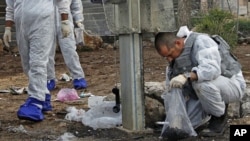Israeli police are combing for suspects after a bomb exploded near Jerusalem's central bus station, killing one person and injuring at least 30.
It had been seven years since an explosion like this had rocked the city.
|
VOA Middle East Monitor host Susan Yackee interviews correspondent Luiz Ramirez who was on the scene of the blast:
|
Ambulances rushed to hospitals with victims suffering shrapnel and other wounds. At the scene of the blast, a bus stood with its windows shattered.
The bombing happened on a busy street that leads into the city, a few meters from the central bus station, at the start of the afternoon commute.
Israeli officials say the bomb had been placed in a bag at a public phone next to a bus stop. Jerusalem District Police Commander Aharon Franco told reporters a search is on for those responsible.
He said security forces are combing the area and its surroundings, looking for suspects.
In the hours after the attack, no one claimed responsibility for the blast.
Prime Minister Benjamin Netanyahu delayed a trip to Russia by a few hours. Speaking as he departed, Mr. Netanyahu promised a strong response.
He said Israel would act resolutely, with responsibility, and wisely to preserve the quiet and security that have existed in Israel over the past few years.
The last bomb attack on a bus in Jerusalem happened in 2004 during the Palestinian uprising known as the Second Intifada.
In the last few days, violence has escalated between Israeli forces and Palestinian militants in the Gaza Strip, who on Wednesday fired a barrage of rockets at southern Israel. Two rockets hit the city of Beersheva. The Islamic Jihad group claimed responsibility for the rockets.
A day earlier, the military wing of Hamas, the Islamist group that controls the Gaza Strip, called for revenge against Israel following Israeli air strikes that killed eight Palestinians, including children.
Yoram Schweitzer is a terrorism analyst who formerly worked in the Israeli intelligence community. He tells VOA that Hamas' new threats could signal a troubling turn of events.
He says Hamas had tried to stop groups like Islamic Jihad from firing rockets during the past year, but has now joined them.
"Since they [Hamas] thought the recent Israeli retaliation [went] beyond what is tolerable in their eyes, allowed, [Hamas] not only allowed the smaller organizations that regularly shot, but also joined the bombardment," said Schweitzer.
Israeli officials on Wednesday said it was too early to tell whether the bus bombing was linked to the violence in Gaza.
Wednesday's explosion was heard throughout much of western Jerusalem. After years of relative calm, many residents initially mistook the sound of the blast for construction noise or fireworks.
Israeli police deployed throughout the city on Wednesday evening, looking for signs of new attacks.




